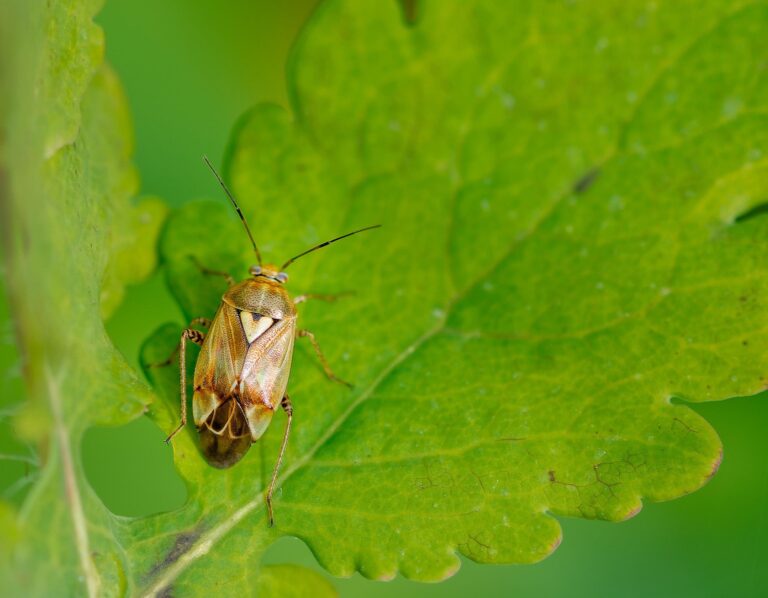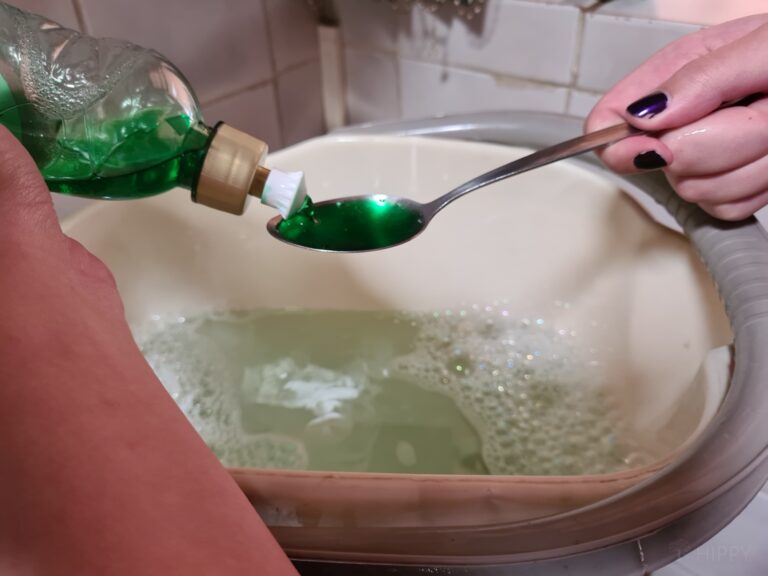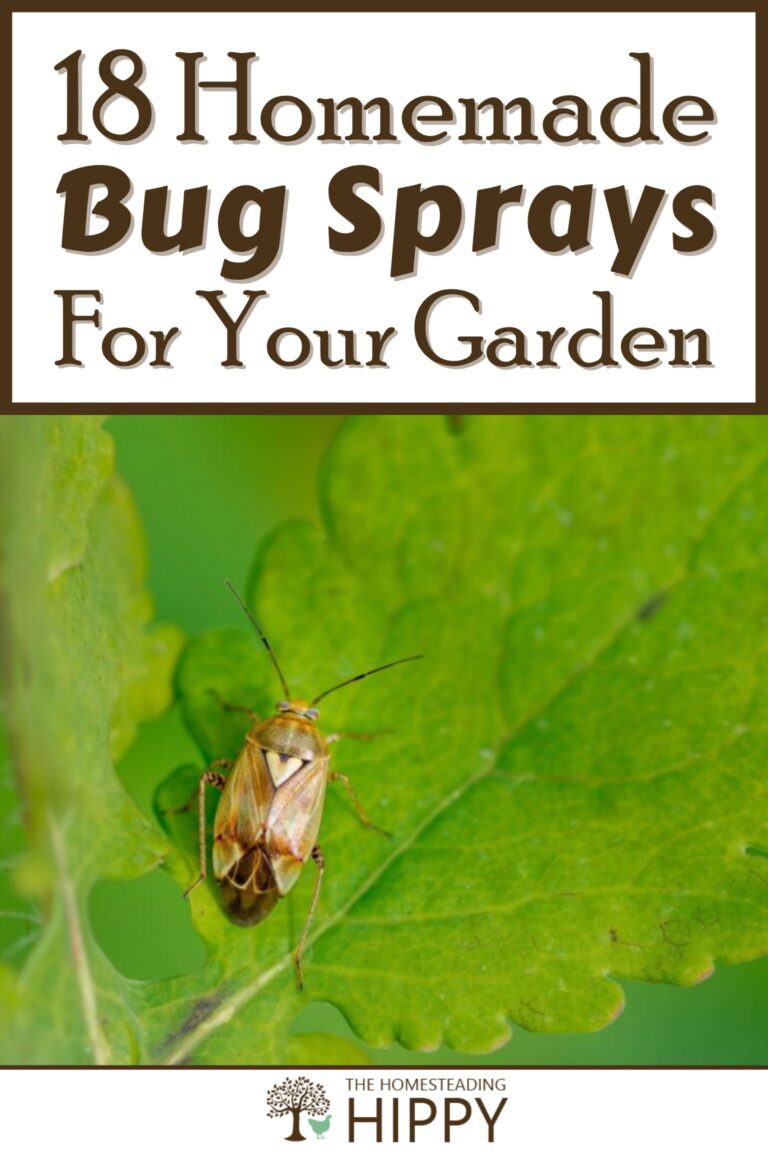Summer is the time of year when most people like to get outside and enjoy their gardens. However, one thing that can ruin this experience is an invasion of bugs.

This summer, don’t let those pesky critters keep you from enjoying your garden.
Try one of these new homemade bug sprays!
Why You Should Use Homemade Bug Sprays
More and more gardeners are turning to natural pest control methods, and with good reason.
Chemical pesticides can be harmful to both the environment and human health. They can also kill helpful insects, such as bees and ladybugs, which can lead to problems down the road.
Fortunately, there are a number of effective homemade bug sprays that you can use to keep your garden free of pests.
These concoctions will not only repel pests, but will also do so in a safe and effective way so you don’t have to worry about what’s going on with your plants.
18 DIY Bug Sprays for Your Garden To Try
If you have a garden, chances are you’ve seen your fair share of pests. From aphids and caterpillars to Japanese beetles and grasshoppers, there seems to be no end to the types of insects that can wreak havoc on your plants.
Fortunately, there are a number of homemade Bug Sprays that can be just as effective. Here are 18 recipes for homemade Bug Sprays that will help you keep your garden pest-free.

1. DIY Insecticidal Soap
Insecticidal soap is a safe and effective way to control pests in the garden. The soap works by suffocating the insects, and it is especially effective against soft-bodied pests such as aphids and whiteflies. Insecticidal soap is also safe for beneficial insects, such as ladybugs and bees.
To make your own insecticidal soap, mix one tablespoon of dish soap with one cup of water. Be sure to use a mild dish soap, such as Dr. Bronner’s, so that it does not harm the plants.
Apply the mixture to the leaves of the plant, being sure to coat the undersides where the insects are hiding. Repeat every few days until the pests are under control.
2. Garlic Bug Spray
If you’re looking for a cheap and easy way to keep pests out of your garden, look no further than garlic.
Garlic bug spray is a safe and natural way to deter a variety of common garden pests, including aphids, whiteflies, and spider mites.
To make garlic spray, simply chop a few cloves of garlic and steep them in water overnight. In the morning, strain the garlic and add it to a spray bottle filled with water.
For best results, apply the spray directly to the leaves of affected plants. Garlic spray is an effective way to protect your plants from pests without resorting to harsh chemicals.
Additionally, garlic is a great source of nutrients for your plants, so using it as a bug spray can also help to promote healthy growth. Give it a try next time your garden is under attack from unwanted pests!
3. Chili Pepper Spray
Chili pepper spray is a homemade mixture that uses chili peppers to deter pests from attacking your plants.
The active ingredient in chili peppers, capsaicin, is a natural repellent for many animals, and it can be just as effective at keeping bugs out of your garden.
Chili pepper spray is relatively easy to make, and it provides an eco-friendly alternative to chemical pesticides. Best of all, chili pepper spray works on a wide range of pests, including aphids, beetles, and caterpillars.
To make chili pepper spray, you will need:
- 1 cup of water
- 1 tablespoon of dish soap
- 2 cloves of garlic
- 1 teaspoon of cayenne pepper
- 1⁄2 teaspoon of hot sauce
Put all the ingredients into a blender and blend until smooth. Pour the mixture into a spray bottle and apply it to your plants as needed.
Be sure to test the spray on a small area of the plant first to make sure it won’t cause any irritation. When using chili pepper spray, be sure to wear gloves and avoid getting it in your eyes or on your skin.
4. DIY Plant Spray With Baking Soda
Baking soda is one of those kitchen staples that has a million and one uses, including in the garden. You can use baking soda to make a DIY plant spray that will help to boost the health of your plants and deter pests.
The benefits of using baking soda in the garden are numerous. For example, it can help to prevent powdery mildew and fungal growth. It also acts as a natural fungicide and can control black spots on roses.
In addition, baking soda helps to adjust the pH levels of the soil, making it more alkaline. This can be beneficial for plants that prefer alkaline conditions, such as lavender and Virginia bluebells.
To make your own baking soda plant spray, simply mix 1 teaspoon of baking soda with 1 quart of water. Add a squirt of dish soap to help the solution stick to the leaves, then spray your plants thoroughly.
Be sure to use this spray early in the day so that the leaves have time to dry before nightfall.
5. Tomato Leaf Spray
Tomato plants are susceptible to a number of pests and diseases, many of which can be effectively controlled with a homemade tomato leaf spray.
Tomato leaf spray is made from the leaves of the tomato plant and contains nutrients that can help to boost the health of the plant.
The spray can also help to deter pests, such as aphids and tomato hornworms, and can be used to treat fungal diseases such as early blight and powdery mildew.
To make a homemade tomato leaf spray, simply chop up a handful of fresh tomato leaves and steep them in boiling water for 15 minutes.
Once the leaves have cooled, strain them out and add the resulting liquid to a spray bottle. For best results, apply the spray early in the morning or in the evening when temperatures are cooler.
6. Rhubarb Leaf Bug Spray
Rhubarb leaf bug spray is a simple and effective way to protect your plants from pests. The leaves of the rhubarb plant contain compounds that are toxic to many common garden pests, including aphids, whiteflies, and caterpillars.
To make your own bug spray, simply chop up a few fresh rhubarb leaves and steep them in water overnight. In the morning, strain the liquid and add it to a spray bottle.
This homemade insecticide can be used on both indoor and outdoor plants, and it is safe for humans and animals.
In addition to repelling pests, this spray also contains nutrients that will benefit your plants.
7. Cinnamon Spray
Cinnamon is a versatile spice that can be used in sweet and savory dishes alike. But did you know that cinnamon can also be used to make a DIY insecticide spray?
Cinnamon is a natural insect repellent, and it can be used to control a variety of pests, including ants, aphids, and mites.
To make a cinnamon spray, simply combine 1 teaspoon of ground cinnamon with 1 quart of water. Add the mixture to a spray bottle and apply it to your plants as needed.
You can also add a few drops of essential oil to the mixture for extra pest-repelling power. Cinnamon oil is especially effective against ants and aphids.
Not only is this homemade insecticide safe for both people and pets, but it’s also inexpensive and easy to make. So if you’re looking for an eco-friendly way to control pests in your garden, give DIY cinnamon spray a try!
8. Onion Scrap Bug Spray
Looking for a cheap and easy way to keep bugs out of your garden? Look no further than your kitchen trash can! Onion skins, coffee grounds, and other kitchen scraps can be used to make DIY bug spray that is just as effective as store-bought insecticides.
Not only is this bug spray environmentally friendly, but it is also very economical. To make your own DIY bug spray, simply steep onion skins or coffee grounds in boiling water for 24 hours.
Once the mixture has cooled, strain out the solids and add the liquid to a spray bottle. You can then use this bug spray just like you would any other insecticide.
So next time you’re looking for a natural way to keep bugs at bay, remember to raid your kitchen garbage can!
9. Neem Oil Bug Spray
Neem oil is a natural insecticide that has been used for centuries to control pests in gardens and homes. The oil is derived from the neem tree, and it works by disrupting the life cycle of insects.
When used as a bug spray, it can help to control a wide variety of pests, including aphids, whiteflies, and spider mites. Neem oil is also effective against fungal diseases such as powdery mildew and black spot.
In addition to being an effective pest control measure, neem oil is also safe for humans and animals. It is non-toxic and does not require special clothing or equipment for application.
To make a neem oil bug spray, simply mix one tablespoon of neem oil with one quart of water. Add a drop or two of dish soap to help the mixture stick to plants, and then apply it to your garden as needed.
10. Diatomaceous Earth
Diatomaceous earth (DE) is a naturally-occurring substance made up of the fossilized remains of diatoms, a type of algae.
Although it is classified as a mineral and is used as a powder instead of a spray, DE is actually composed of tiny silicon dioxide particles that are incredibly sharp.
These jagged edges help to cut through the exoskeletons of pests like insects and spiders, causing them to dehydrate and die. In addition to being an effective pesticide, DE can also be used as an insect repellent, garden fungicide, and natural weed killer.
When applied regularly, DE will help to keep your garden free of pests all season long!
11. Vegetable Oil Spray
Gardeners have long known the benefits of using vegetable oil to protect their plants from pests.
Vegetable oil spray is a safe and natural way to keep pests off of your plants, and it is also very easy to make. Simply mix together one part vegetable oil and one part water in a spray bottle, and add a few drops of dish soap.
Shake well, and then spray liberally on your plants. The soap will help to break down the surface tension of the water, allowing the mixture to stick to the leaves better.
The oil will smother any pests that are present, and the soap will help to wash them away.
This safe and effective recipe can be used on almost any type of plant, and it is a great way to keep your garden pest-free.
12. Vinegar Spray
Vinegar is a household staple with a variety of uses, and it turns out that it can also be helpful in the garden!
Vinegar spray can be used as a non-toxic way to control weeds and pests. It is also effective at killing bacteria, making it a great choice for cleaning gardening tools.
To make your own vinegar spray, simply mix equal parts vinegar and water in a spray bottle. You can add a bit of dish soap to help the mixture stick to the plants.
Be sure to test the spray on a small area of plants before applying it more widely, as vinegar can burn leaves if used in too high of a concentration.
When used properly, vinegar spray can be a safe and effective way to keep your garden healthy and beautiful.
13. Cayenne Pepper Spray
Many gardeners are familiar with the benefits of cayenne pepper spray as a way to deter pests. Made from a mix of water and cayenne pepper, this all-natural spray is safe for both humans and animals.
Cayenne pepper spray works by causing irritation to the eyes, nose, and throat of pests. The capsaicin in the peppers is what gives the spray its peppery smell and fiery flavor.
While cayenne pepper spray is effective at deterring many common pests, it is important to note that it will not kill them.
For best results, use cayenne pepper spray early in the season before pests have a chance to do serious damage to your plants. To make your own cayenne pepper spray, simply mix 1 part cayenne powder with 10 parts water.
For a stronger solution, add a tablespoon of dish soap. Store the mixture in a glass jar and keep it in a cool, dark place.
When ready to use, shake well and apply directly to leaves or stems being bothered by pests. Reapply every few days as needed.
14. Lemon Eucalyptus Spray
Mosquitoes can quickly ruin any outdoor gathering, and even expose you to serious diseases like the Zika virus. Luckily, there is a natural way to keep them at bay: lemon eucalyptus spray.
This insect repellent is made from the oil of the lemon eucalyptus tree, and it has been proven to be just as effective as DEET in protecting against mosquitoes.
In addition to being a safe and effective mosquito repellent, lemon eucalyptus oil also has numerous benefits for your garden. It can help to control aphids and other pests, and it can also be used as a natural fungicide.
To make your own lemon eucalyptus spray, simply combine 1 part lemon eucalyptus oil with 10 parts water in a spray bottle. Shake well before each use, and apply liberally to exposed skin.
15. Garlic and Onion Plant Spray
Garlic and onion plant spray is a natural way to deter pests from eating your plants. The strong smell of garlic and onion repels many common garden pests, including aphids, beetles, caterpillars, and mites.
You can make your own garlic and onion plant spray at home with just a few simple ingredients.
To make garlic and onion plant spray, you will need:
- 1 pound of peeled garlic cloves
- 1 pound of peeled onions
- 1 gallon of water
- 1 tablespoon of dish soap
- A blender
Simply blend the garlic and onions in the blender until they are finely chopped. Add the chopped garlic and onions to the water and let steep for 24 hours.
After 24 hours, add the dish soap to the mixture and stir well. Pour the mixture into a clean spray bottle and apply to your plants as needed.
16. Peppermint Bug Spray
Peppermint is a popular herb that can be used in many different ways. Peppermint oil is often used as an ingredient in bug sprays, as it is known to repel many common pests.
In addition to keeping bugs at bay, peppermint oil can also provide a number of other benefits for your garden.
For example, it can help to improve the health of your plants by discouraging fungal growth and promoting root health. Peppermint oil can also help to reduce stress levels in plants, making them more resistant to disease.
If you’re looking for a natural way to protect your garden from pests, peppermint oil is a great option.
To make a peppermint bug spray, simply combine one cup of water with fifteen drops of peppermint oil in a spray bottle. Shake well and spray liberally on plants that are affected by pests.
17. Cedarwood Spray
Cedarwood oil is a powerful essential oil with many benefits. Not only does it smell wonderful, but it can also help to repel pests and promote plant growth.
Cedarwood oil can be used in a variety of ways, but one of the most effective is to make a cedarwood spray. To make a cedarwood spray, simply add 30 drops of cedarwood oil to a clean spray bottle filled with water.
Shake well and then use as needed on your plants. This spray will help to keep pests away and encourage healthy growth. You can also add other essential oils to the mix, such as Lemongrass or Eucalyptus, for even more pest-repelling power.
18. Citrus Peel Spray
Citrus peel spray is a natural insecticide that can be used to deter pests from your garden. The active ingredient in citrus peel spray is limonene, which is a compound found in citrus fruits.
When sprayed on plants, limonene repels aphids, whiteflies, and other common garden pests.
Citrus peel spray is also effective against spider mites and earwigs. To make citrus peel spray, simply simmer citrus peels in water for 30 minutes. Then, strain the peels and add the water to a spray bottle.
For best results, use citrus peel spray early in the season before pests have a chance to infest your plants.
Final Thoughts
While there are many commercial pesticides available, these products can be expensive and may contain harmful chemicals. A more sustainable option is to make your own bug spray using natural ingredients.
However, it’s important to always test your bug spray on a small area of plants before applying it more broadly.
This will help you to identify any potential adverse reactions and ensure that the spray is effective against the target pests.
If you’re looking for a natural and homemade way to keep bugs away from your garden, try one of these recipes!
Not only will they work great, but they’ll also leave your garden smelling amazing. Have you tried any of these bug sprays yet?

Tom has built and remodeled homes, generated his own electricity, grown his own food and more, all in quest of remaining as independent of society as possible. Now he shares his experiences and hard-earned lessons with readers around the country.
Find out more about the team here.
